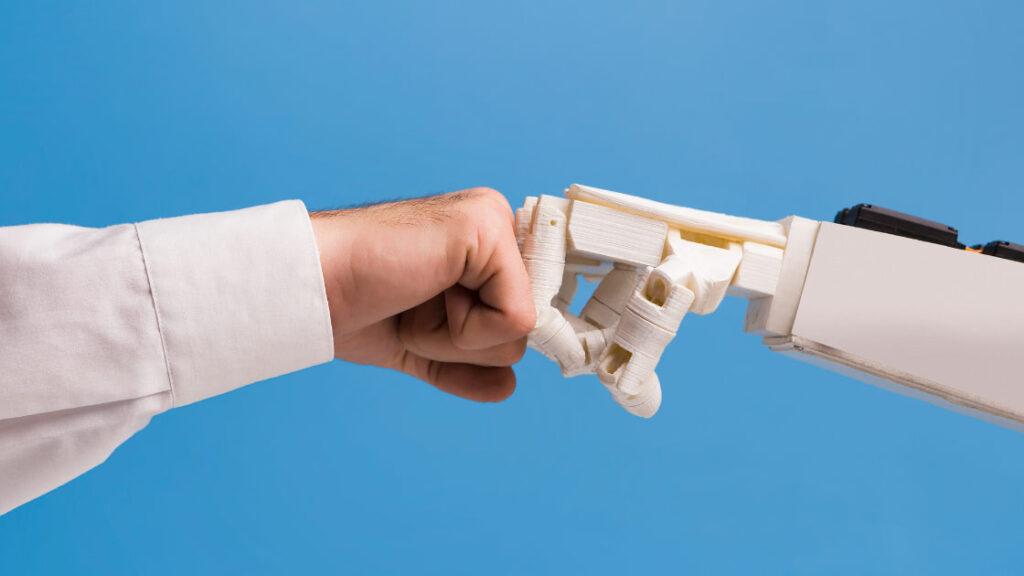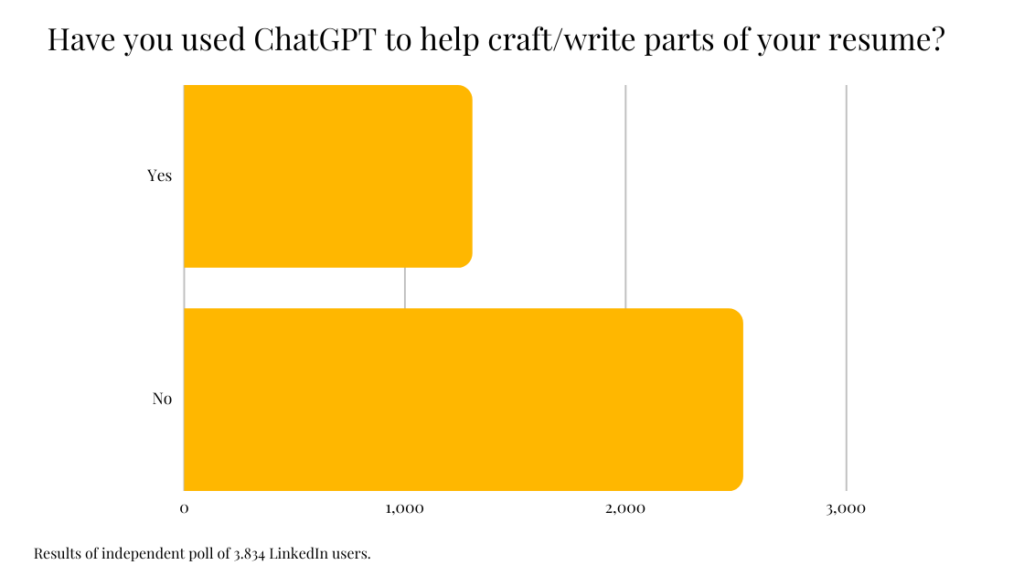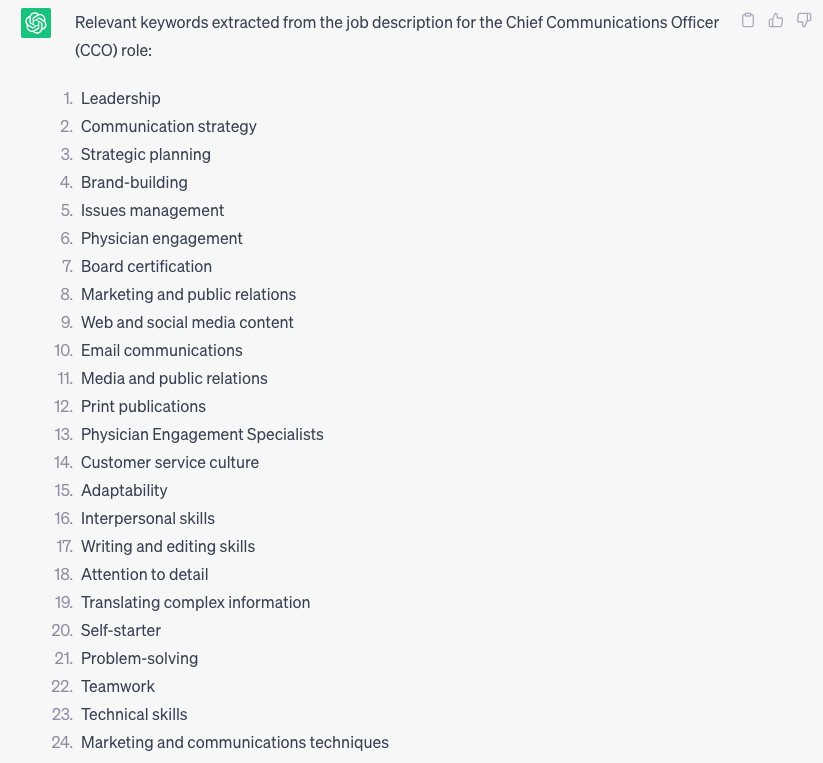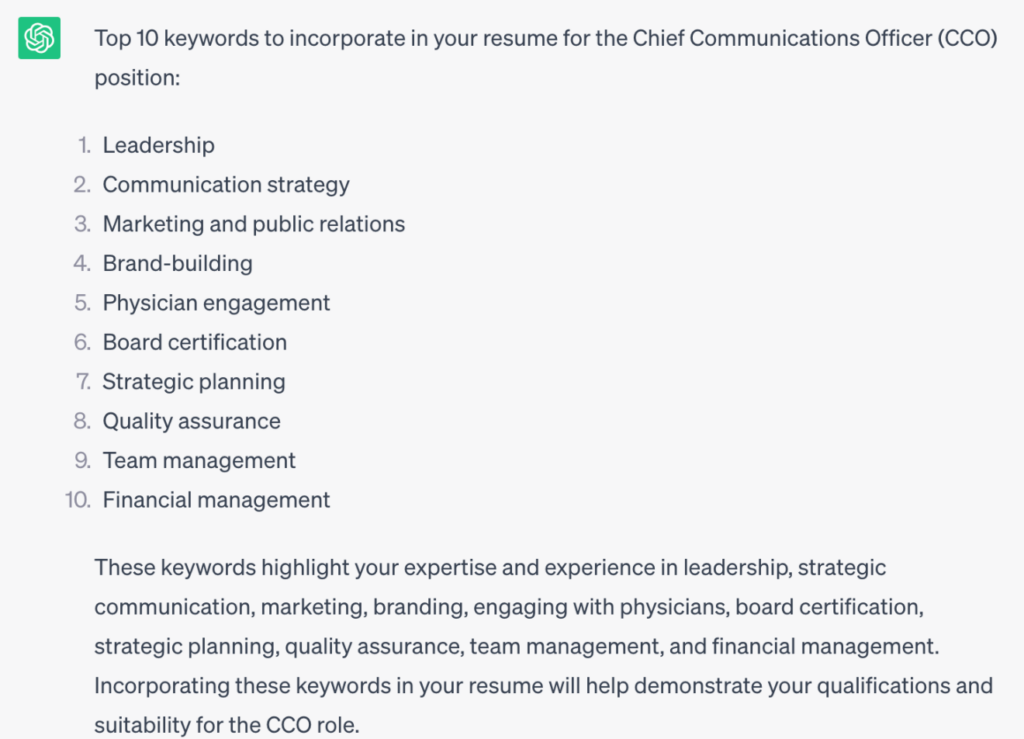
In today’s fast-paced job market, a well-written resume is crucial for standing out from the competition and making a strong first impression on potential employers. Traditionally, job seekers would spend hours crafting their resumes, carefully choosing their words and formatting to present their skills and experiences in the best light. ChatGPT and other AI text generators offer a seemingly easier, faster, and more efficient option for writing a resume. But does the output reach the caliber and effectiveness of a personally written resume?
I recently polled my LinkedIn followers, asking them if they had ever used ChatGPT to write or help write their resume. The majority hadn’t. While I would discourage anyone from using the platform to craft a resume from scratch, I do feel like there are pros and cons to using it to assist with the process.

The Rise of AI in Resume Writing
The introduction of ChatGPT has opened a world of new applications for AI-generated content. It seems like every day, there is a new app or site that promises to alleviate mundane tasks and time-consuming content work with AI-powered tools.
As soon as ChatGPT hit the scene, resume writing was one of the first uses for its technology. With the rise of AI in resume writing, job seekers now have access to valuable help in crafting a polished resume. However, it is important to balance the automation provided by AI and the human touch required to ensure authenticity and individuality in resumes.
Traditionally, resume writing has been a manual and time-consuming process. It involved identifying relevant skills, experiences, and achievements and organizing them in a compelling way. Extra time is often spent tailoring resumes for different job applications. For example, a job seeker might need to adjust the order of their resume to emphasize different skills depending on the role they are applying for.
Artificial intelligence has radically changed the resume writing landscape. Several AI-powered tools have emerged to automate and streamline resume creation, including ChatGPT. These tools use machine learning and data analysis techniques to generate resumes. Previously, this would be a manual process that would take hours to complete or would simply be ignored in the interest of time and energy. While a job seeker could gain time in using AI to create their resume, there are limitations in what is produced that should be considered.
Limitations of ChatGPT Resumes
While AI-powered resume writing tools have revolutionized the industry, they are not without their challenges and limitations.
1. Lack of Personality
A resume generated entirely using AI-powered sites like ChatGPT has a lack of human touch. AI-written resumes can lack the creativity and personality of a human-crafted resume making it difficult for recruiters to get a sense of the individual’s skills and experience. A great resume tells a story and connects the reader (i.e. hiring manager or recruiter) with the candidate. An AI-crafted resume may lack the storytelling aspect of a human-crafted resume, which could help to provide an overall picture of the candidate’s skills and experience.
2. Potential Bias
AI algorithms can perpetuate biases in the data they’re trained on, leading to biased resumes. Resume bias can occur when AI algorithms have been trained on data sets with a lack of diversity or outdated job descriptions. This can lead to results that are skewed and inaccurate. To ensure a resume accurately reflects the individual’s experience and capabilities, it is important for a jobseeker to review their resume and make adjustments.
3. Errors in Understanding Context
When prompted to write a resume, AI tools may not understand the context. It’s possible AI tools can’t grasp nuances, context, or industry-specific requirements, leading to inaccuracies or irrelevant information. For instance, a resume generated by AI may list experience in a completely unrelated field, offer education details that are not directly relevant to the job being applied for, or include other information that is not tailored to the job.
Using ChatGPT to Enhance, Not Write Your Resume
Due to the limitations of resumes created with ChatGPT and other AI-powered tools, the process of creating a resume using them is not recommended by recruiters and hiring managers. While hopping on ChatGPT and prompting it to “write my resume” is discouraged, there are some time-saving ways to allow ChatGPT to enhance your resume.
1. Extract Keywords from Job Description
One of the top pieces of advice I give for writing a great resume is to use keywords from a targeted job description. A job description should be used as a road map for your resume.
Using a prompt in ChatGPT such as “Review the job description for {insert target role title} provided below and extract relevant keywords that could be used to enhance my resume when applying for this position.
-Start of Job Description
{Paste text from job description}
-End of Job Description”
I provided a job description for a Chief Communication Officer using the prompt above. I was provided with over 40 keywords that could be incorporated into relevant sections of a resume, such as the skills summary, work experience, and qualifications. Below is an example of what was returned by ChatGPT.

When using a more specific prompt, I am provided with fewer keywords that are more specific. Below was the return from ChatGPT for the same job description after inputting the prompt “Review the job description provided below and return the top 10 keywords I could incorporate in my resume when applying for this position.”

2. Use it to help reword custom content.
“Summarizing your custom content is a great use of ChatGPT. Carefully read the results, as it will add in generic terms at times or things that aren’t quite right. But it can give you ideas of new phrasing and more concise language.” Marie Zimenoff, Career Coach & Resume Writer
Using AI for content generation on a resume can be a powerful tool for enhancing the efficiency and accuracy of one’s professional profile. By leveraging AI technology, individuals can generate personalized and impactful content that highlights their skills, experiences, and achievements. AI-powered algorithms can analyze vast amounts of data, identify relevant keywords, and craft compelling sentences and bullet points. This saves time and effort and ensures that the resume is tailored to specific job requirements. By incorporating AI in content generation, job seekers can showcase their unique value proposition and increase their chances of grabbing the attention of potential employers.
“The two most useful things I have done with it are to take executive summaries that are already pretty good and make them more concise and also by taking bullet points that *already show results* and put them into a more concise format like the Google XYZ style.” – Diana Alt, Career Consultant
3. ChatGPT will create Boolean search for you
“I’ve enjoyed it because it gives me something to edit and overcome staring at a blank page figuring out how to write out an idea. It’s a good starting point, but only a starting point.” – Shawn McAndrew,
VP, Business Development and Client Engagement
ChatGPT can assist in creating a boolean for resume content by generating search queries or statements that can be used to filter or verify certain criteria. For example, if a job seeker wants to highlight their proficiency in a specific programming language, ChatGPT can generate a boolean search query using relevant keywords and operators. This boolean can then be used to identify and extract relevant experiences or achievements from the resume content. By leveraging ChatGPT’s language generation capabilities, job seekers can efficiently create boolean statements that help recruiters or hiring managers quickly identify the desired skills and qualifications when reviewing resumes.
Practice makes perfect
“If job seekers are not practiced with feeding ChatGPT good facts and narrowed prompts – they are going to get resume content that is generic and unhelpful.” – Adrienne Tom, Executive Resume Writer
The information from ChatGPT should be used only as a starting point; combining it with one’s own experiences and expertise is crucial for creating a truly personalized and compelling resume.
While AI-powered resume generators offer convenience and speed, they have limitations compared to professionally written resumes. The human touch, contextual understanding, tailored content, accuracy, and flexibility that professional resume writers bring to the table cannot be replicated by machines. Ultimately, the decision between a professionally written resume and one generated by an AI depends on your specific needs, preferences, and the level of personalization you seek in your job application materials.
